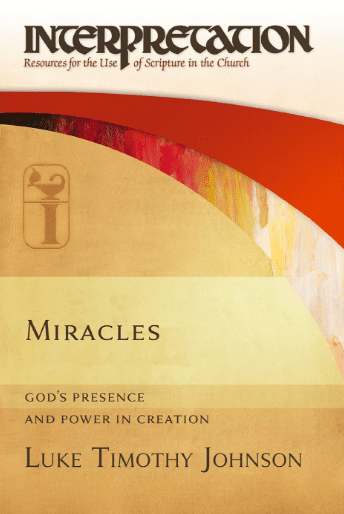 Luke Timothy Johnson connects — with theological force and accuracy — prophecy to miracle; in Luke Timothy Johnson’s, Miracles: God’s Presence and Power in Creation.
Luke Timothy Johnson connects — with theological force and accuracy — prophecy to miracle; in Luke Timothy Johnson’s, Miracles: God’s Presence and Power in Creation.
What Johnson says here is why it is so unhelpful for so many today to equate the “prophetic” with criticism of the federal, state or local government. To be prophetic has a much deeper claim that the capacity to criticize — often done on the internet or in some kind of public boycott. Bloggers or those with a big platform are not thereby qualified to be prophets.
Johnson gets it right, as it begins with a revelation from God in an experiential encounter with God:
My recitation of prophetic experiences has a point. The prophets appear as human beings whose ordinary life has been interrupted or intersected by some experience of transcendence …
and that experienced reality contains a message:
bearing within itself a “word” that the prophet feels impelled to deliver, even at the risk of mockery, misunderstanding, and persecution.
It’s both, not just word and not just experience, but experience embedding a word of revelation:
The prophets’ experience of the divine presence and power is not incidental to the word they deliver. In many cases, indeed, the word is communicated by that experience and is deciphered through the interpretation of such a vision.
Again:
The prophetic books provide us the opportunity to reflect on miracles from another angle, now not as the performance of astonishing deeds that effect change in the external world—such as a limb being straightened that formerly was bent—but as the manifestation of God’s presence and power through human perception and speech…
Thus, this is not simply perception but neither is simply natural:
The prophets therefore show us the irreducibly experiential basis for claims to the miraculous. It is possible and indeed natural to ascribe the movements of peoples and the noise of wars, in the ancient as in the contemporary world, to purely human agency, the consequences of human calculation and will. There is usually nothing on the surface of such events to demand a more mysterious cause. The statement “This is all the work of God,” if it is to be more than a broadly theoretical argument about providence, makes sense only on the basis of the powerful (and often disruptive) experience of God’s work within the fabric of an individual’s or group’s experience that can then address the larger context.
The prophet communicates the divine origin of his or her words, and this too is important for casting a critical eye on what is so often today called the prophetic:
Such personal (and sometimes communal) experience cannot be communicated through general propositions and arguments concerning the nature of the world, but must be communicated through forms of personal witness: “I saw the Lord, . . . high and lofty” (Isa. 6:1-18); “the Lord said to me” (Isa. 8:1; Jer. 1:7); “thus says the Lord God” (Ezek. 5:5).
The language of the prophet trades on the common because they are often talking about the quotidian and ordinary in real life:
For the most part, though, the prophets’ language draws from the noncultic world, finding poetic metaphors in the realms of weather (normal and abnormal), animal behavior, agriculture, trade, human sexual activity, and household objects (pots, plumb fines, paving stones), and using them to interpret the social and political events of their day. In this way, the prophets are the most realistic and “worldly” of biblical figures. Their visions do not offer an escape from the entanglements of social and political life, but a distinctive perspective on those entanglements: God’s perspective.
Prophets utter their words with great risk:
Because the miracle that is prophecy is so subjective, so based in personal experience that is not accessible to the gaze of others, the prophet is extraordinarily vulnerable. Certainly the small glimpses we get of the life experience of Isaiah, Amos, Ezekiel, and Hosea suggest the lands of mockery and persecution that prophets might expect from others, and the kind of shame and uncertainty they might feel from within.
The prophetic then is an interplay between revelation and word and fulfillment:
The first miracle of prophecy, then, is that humans speak and act through divine agency. The second miracle is that the words of the prophets are actualized in the empirical order through the same divine agency. Such “fulfillment” is a powerful pointer to God’s presence and power in creation, for it is clear that no human power can bring about the empirical realization of a human prediction months, years, decades, or even centuries after it is spoken. The second miracle, in effect, certifies the miraculous character of the original oracle, for neither can humans of their own power accurately predict what will happen in the future.
I don’t know scholarship in the prophets well, but Johnson’s bibliography falls short: no Heschel? Has anyone grasped the interplay of the existential, experiential and word as he did with his concept of pathos? no David Stacey on prophetic actions?











